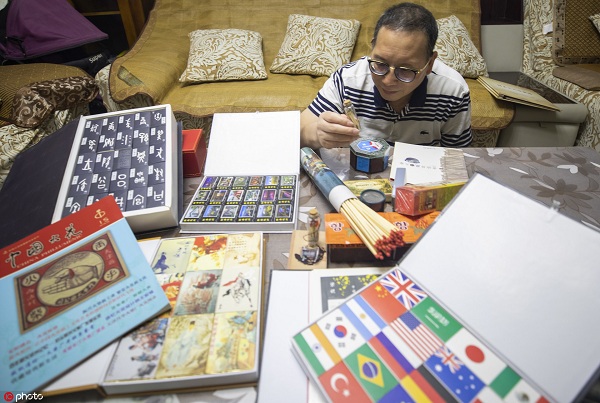Match industry seeks its place in the sun
Hangzhou firm looks to safeguard China's heritage and expertise in ancient craft.
For thousands of years, the ancient Chinese started fires like other ancient cultures - they used small pieces of wood or twisted rope as kindling; struck flint against rocks containing iron pyrite or steel; or used coals kept burning in shells, bone or horn.
It was in the middle of the 18th century that wooden matches were first introduced to China, thus becoming an essential part of Chinese people's everyday lives.
"Few people are using matches now, but I will keep working as I believe this industry is still promising," Hu Wuyin, director of Hangzhou Match Factory, which stands at a turning point after 110 years of development, told China Daily.

Hu Wuyin, director of Hangzhou Match Factory, with his collection of match boxes from various countries at his factory in Hangzhou, Zhejiang province [Photo/IC]
Hu handed in an application for the factory's entrance into the list of intangible cultural heritages in Shangcheng district, Hangzhou in June, embarking on a new journey to rejuvenate the traditional business. He believes the making of matches is part of the national industry and is something that needs to be preserved for the young generation.
"Preserving the techniques of making matches by applying for the official recognition will let more people learn about the cultural charm behind the small wooden sticks," Hu said.
Founded in 1909, Hangzhou Match Factory thrived in the 1980s. At that time, there were more than 1,400 workers and annual sales surpassed 800,000 boxes.
"My family is closely connected with the factory. My grandmother, mother and siblings all worked there at different times," said Hu, adding that his family has strong feelings toward the factory's development.
However, with the popularization of lighters, the business went from bad to worse in the following years.
Hu took over the factory in 2006 after being a worker there for three years. According to the director, the first few years of his administration saw a plunge in the match business nationwide. In 2008, the production volume of Hangzhou Match Factory shrunk to 250,000 boxes due to the global economic crisis and the number got smaller and smaller.





 play
play